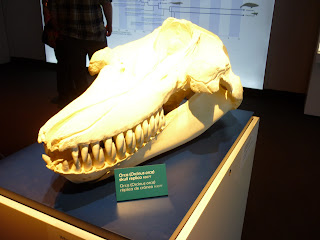I have written about various OMSI exhibits before, but that is usually going for one thing.
This time, we were very interested in the Orcas exhibit, but also interested in The Arctic: Our Last Great Wilderness, playing at the Empirical Theater.
Then, as long as we were there, we would also check out one of the Planetarium shows, and the new restaurant.
It's still not everything. We did not spend any time on the regular exhibits or into the submarine, mainly for lack of interest. In addition, there are always different movies and shows.
Nonetheless, we did a lot and had a pretty good time.
I'm afraid the Planetarium came in last. We were interested in how the Sesame Street one would go, but I still thought there would be more to it, and all they really did was identify the Big Dipper and the North Star. I already knew those ones.
My shocking conclusion is that the Sesame Street one is geared for kids, which is only shocking in that material suitable for children will still often have more for adults, and that just wasn't the case here. However, it did fit with our schedule.
Obviously, I took many more pictures of the Orcas exhibit, but there were many to take.
For one thing, it was a good reminder of the connection local tribes have to the species, and a reminder that they are important to the history of this area.
There was also good information about the species, and some of the social structure that can't easily be recreated when humans disrupt their living situations.
There was significant information on the history of the whales in captivity, from where it started to the current state.
As sobering as that was, a collection of ocean litter was a reminder that there are other ways in which we negatively impact their existence.
I did not see any references to White Gladis, destroyer of rudders and tutor to other Orcas on how to do so (I believe the exhibit was created before she gained her current level of notoriety), but they may be the type to hold a grudge, and act on it.
It was not all "Humans: Bad!"; the theme was that we share a future, and we need to think about that.
That made the pairing with the Arctic movie appropriate. There is a common appreciation of irreplaceable nature and a reminder of our responsibility toward it.
That just leaves Theory, the new restaurant.
Our first thought was "restaurant"? That's kind of a stretch. But no, this is not the little snack counter by the theater, but a separate spot, and kind of an attractive venue. There's even a fireplace!
The food was pretty good and the prices were better than you might expect for a museum.
My primary complaint was that while there seemed to be a focus on local and quality and even sustainability, there ended up being too much trash with our meal.
I believe with a little effort, everything could have been either reusable or compostable, and yet that didn't happen. Maybe it still can.
COVID: No staff was masked, and neither were most patrons. That is becoming more the norm, but remains a source of frustration.
Accessibility: Mobility is mainly good. The Orcas exhibit is on two floors, and the natural flow involves stairs, so you do need to detour a bit. I was pleased to see not just Spanish translation, but Braille.
I was a little shocked going into the Empirical Theater. Okay, the steps are steep and it is easy to get a sense of vertigo, however, this time there was also a long, really dark passageway to even get there which seemed dangerous. We used cell phones to light the way, which is a pretty easy solution, but it seems like a problem that shouldn't be there in the first place.
It is harder to tell with the Empirical Theater, but it looks like the last showing of The Arctic: Our Last Great Wilderness is August 6th, 2023. Perhaps look for other viewing opportunities:
https://www.protectthearctic.org/arctic-national-wildlife-refuge-giant-screen-film
Both are recommended.
https://omsi.edu/









































































